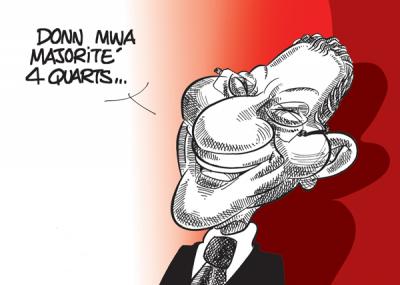In the November issue of the London-based monthly Mauritius News, the editor Peter Chellen aired his views on the proposals of electoral reform made in the past by two former Mauritian parliamentarians Guy Ollivry and Rama Sithanen.
Guy Ollivry, leader of the defunct UDM, submitted his proposal a decade ago. The proposal was “a plea in favour of Proportional representation on the ground that it would prevent the 60-0 phenomenon that occurred twice in Mauritius.” The first 60-0 was in 1982 when the MMM (with Anerood Jugnauth on board) on its own steam won all the 60 seats in the National Assembly. The second 60-0 came in 1995 when the Labour Party, “in alliance with the MMM of Paul Bérenger, took all the seats in the Assembly leaving none to their political adversaries, the ruling MSM of Sir Anerood Jugnauth who left the MMM in 1983 to create his own party.”
Antidotes to 60-0 phenomenon and communalism
In Guy Ollivry’s view Proportional Representation is the perfect antidote to the 60-0 phenomenon. The editor of Mauritius News thinks otherwise, and even asserts that PR is equivalent to a negation of the vox populi vox dei : “Mr. Ollivry believes that PR would rid the country of this 60-0 phenomenon. Unfortunately, the fact is that, in spite of some cliché, people vote essentially for the party and not necessarily for the individual MP. It has been said in Mauritius that an out-and-out partisan will vote even for a monkey if such an animal is fielded by his party as a candidate. It must be an enormous pleasure for the electors to witness the total wipe out of a party, with all its members, when it has lost all sense of direction. Mr. Ollivry says that this is not good. Under the PR system, the hated party (or coalition) must still have some MPs in the House, in accordance with the votes obtained, he reckons. This could be thwarting the wishes of the electorate.”
Former Finance Minister Rama Sithanen “argued for a modicum of PR to eliminate the Best Loser System, which he said encouraged communalism.” The editor of Mauritius News questions the validity of this proposal arguing that “communalism is ingrained in the Mauritian psyche, i.e. in the Mauritian way of life, culturally, religiously, politically, etc., etc.” He proves his point by referring to the practice of effecting nominations in the public and private sector on the basis of communal consideration:
“We will not shout loud enough to say that communalism is ingrained in the Mauritian psyche, i.e. in the Mauritian way of life, culturally, religiously, politically, etc., etc. Senior posts, be it in Government or the private sector are NORMALLY effected on the basis of communal consideration (police chief, Service Commissions chairman, Cabinet Secretary, etc.). If we have a look at appointments in the Mauritius Diplomatic Service under whatever government we can see that there is yet to be a High Commissioner in Australia who is not from the General Population and there is yet to be a High Commissioner in the UK from the same General Population. The same practice may be taking place at the UN and in other embassies. This is the prevailing mentality of our country. Can Mr. Sithanen assure us that any Constitution reform will eliminate the communal spirit in Mauritius?”
The virtues of the First Past The Post
The views expressed on electoral reform by the editor of Mauritius News in the November issue follow the ones he formulated in the October issue of the paper on the present electoral system – the First Past The Post (FPTP) conveniently supported by the Best Loser System – which, according to him, is working perfectly well. “The Mauritius electoral system handed over to the island by Britain on the accession to independence in 1968 has worked well so far with the First Past The Post (FPTP) application,” writes Peter Chellen. “It has worked well essentially in safeguarding the interests of every ethnic group making up the Mauritian nation. Why do we have to tamper with it now?”
Although “with the combination of FPTP and PR, the country will rid itself of the Best Loser System”, MN editor advises caution. There is no need to rush as the present system can be improved. “It must be agreed that there is a case for a revision of the system without its demolition, e.g. to ensure adequate female representation in the National Assembly, to prevent influential rich people and businesses to gain political favours in funding election campaigns, etc.” MN editor concluded the October article with a plea in favour of the extension of the right to vote to Mauritian citizens abroad. “There is also a case for the RIGHT TO VOTE to be extended to the Mauritian citizens living in other countries. How many times have we heard politicians say that they would like to tap into the resources available within the Mauritian diaspora. The Diaspora should therefore not be ignored.”
“MAURITIUS NEWS” – READ FOR YOU: A reflection on the limits of two proposals on the electoral reform
- Publicité -
EN CONTINU ↻
- Publicité -

